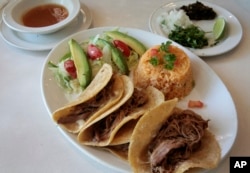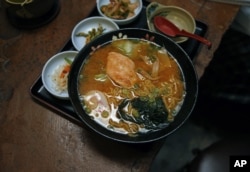For generations, Italian food has reigned as America's favorite ethnic cuisine. And while that’s still technically the case overall, younger Americans’ taste buds are threatening to upend Italian dominance of the U.S. ethnic food chain.
Millennials, people between the ages of 27 and 42, are the first generation to say they prefer Mexican food to Italian. And Gen Z, those who are 8 to 23 years old, have an even deeper craving for tacos and other Mexican foods, according to a recent report.
“This was the first time that we have ever seen, since we've been studying consumers, this change happen in a generation,” says Mike Kostyo, trendologist and associate director of Datassential, the Chicago-based market research firm that released the report. “I think the most surprising thing was just how passionate Gen Z’s affinity for Mexican cuisine was … and to see that happen in a relatively short amount of time. I mean, that was huge.”
Eighty-two percent of all Americans still say they like or love Italian food, according to the Datassential report. But millennials chose Mexican as their favorite ethnic cuisine, followed by Italian and then Chinese. Meanwhile, the 23-and-under crowd pushed Italian down to third place, behind Mexican and Chinese.
“That was really interesting to see the foods that younger consumers felt were nostalgic and comforting,” Kostyo says. “The two best examples of that were tacos and ramen [Japanese noodle soup]. So, those are two things the younger generations said, ‘They're very comforting to me. I love them.’”
Gen Z can easily satisfy their growing taste for Asian food because 12% of all restaurants in the United States serve some kind of Asian food, according to a Pew Research study, which also found that seven out of 10 Asian restaurants in the nation serve Chinese, Japanese or Thai food.
“Chinese restaurants were the most popular, so they're found in every state and in 70% of all counties,” says Sono Shah, lead author of the study. “Every state, and a third or more of all counties, also have at least one Japanese or Thai restaurant.”
Demographic changes are one of the forces behind America’s changing palate.
U.S. Census numbers show that the Latino population grew by 23% in the past decade. The 2020 Census also shows that Asians make up 6.2% of the U.S. population.
However, some of Asian cuisine’s rise in popularity might be the result of intentional efforts.
“Food often represents one of the main ways people come into contact or experience or are exposed to different cultures,” Shah says. “The Thai government has sponsored programs abroad to increase the number of Thai restaurants throughout the world as a form of diplomacy.”
Another main driver of change is social media, where young people often share what they’re eating online.
“We used to say that it took about a dozen years for a trend to move from very early stages, brand-new trend with consumers, all the way to what we call ubiquity, a trend that's everywhere. And now, it's about half that,” Kostyo says. “And that's predominantly because of technology and social media, and just the speed of communication.”
Italian favorites like pizza and lasagna have been declining on menus over the last decade, while tacos, ramen and other Asian-inspired dishes continue to grow, according to Datassential. And Kostyo expects the next 10 to 20 years to reflect those changes.
“Where before maybe the go-to comfort food item, or classic traditional item, might have been a pizza, if you were opening a classic, everybody-loves-it restaurant ... it would have been a pizza operation,” Kostyo says. “I think in the future, it's going to be a taco operation. That will be the go-to.”







